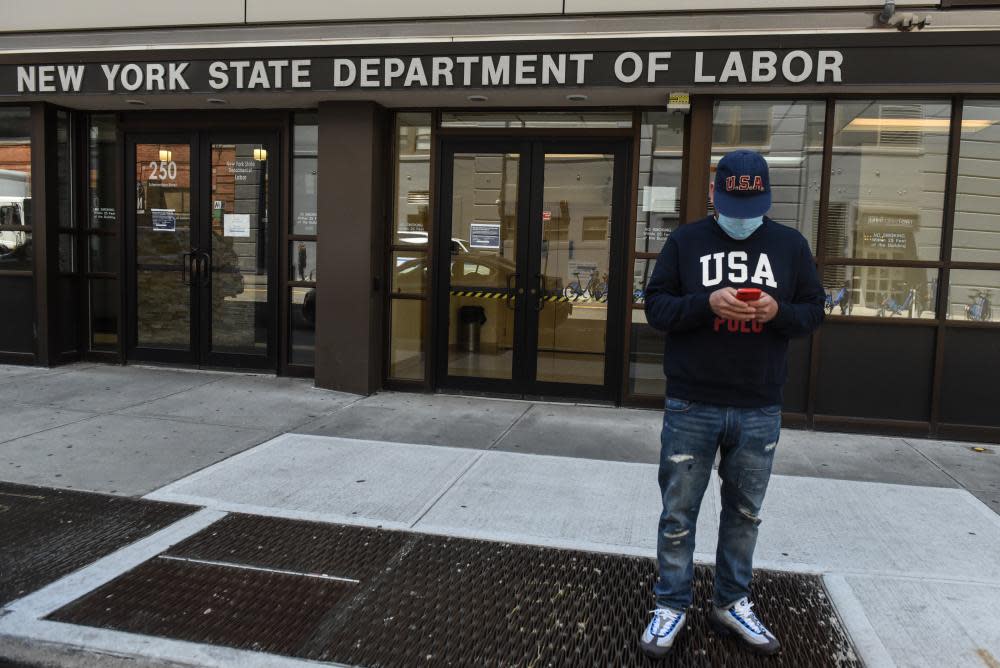'I don’t know how I’ll survive': the laid-off workers devastated by coronavirus cuts

Sandra Rivera Del Valle, a cabin cleaner with airline contractor Eulen America at Orlando airport in Florida, started experiencing cold-like symptoms on 13 March. As a cancer survivor over the age of 60, she was advised by her doctor to quarantine for two weeks as a precaution, as she was unable to get tested for Covid-19.
Related: Extra $600 in jobless pay offers many a lifeline – but will it be renewed?
After taking two weeks off of work, unpaid, Del Valle’s supervisor then told her she had been laid off – and would have to reapply for her job.
Suddenly, she was staring economic ruin in the face.
“I started getting very anxious about where I was going to get money. I maintain a household with my daughter and father. I don’t have a way to pay my bills. I don’t know how I’ll survive from now on because I don’t have a job,” said Rivera Del Valle.
“I feel like I’m going crazy because I don’t know how I’m going to pay rent, buy food, pay the electric bill or my car.”
She is hardly alone. More than 40 million Americans have now filed for unemployment benefits since the coronavirus pandemic began, and triggered widespread economic shutdowns that have brought havoc to the American economy.
Across the US, it has been a devastating blow for individuals, families and communities, as stores have closed, factories have ceased production and household names such as Hertz and Macy’s have filed for bankruptcy. Theirs are stories of lives put on hold; of finding themselves on the edge of poverty; of not making the rent; and where putting food on the table suddenly becomes a question, not a certainty.
For Rivera Del Valle, it means she can no longer afford her health insurance premiums, and the Florida unemployment benefits website has not been accessible for her to use. She filed an application for unemployment benefits by mail, but has yet to receive any money.
Tens of thousands of workers around the US have found themselves in similar circumstances as they seek to access the benefits they now desperately need. They are still navigating overwhelmed state agency systems in order to complete their claim applications, or struggling with the lack of options because they are deemed ineligible to obtain benefits.
Though parts of the US economy have begun to reopen with lockdown restrictions being eased, US unemployment is expected to continue to climb through June 2020.
In a recent interview, the White House economic adviser Ken Bassett forecast the unemployment rate will climb to over 20% through June, with double-digit US unemployment rates possible through November.
Michael Reich, an economics professor at the University of California, Berkeley said the high unemployment rate is likely to have a long-term effect on US workers beyond the next few months.
“Some workers who were let go will be able to return to their original jobs; a few others will find new jobs. [But] unemployment for the vast majority is likely to last longer than the current maximum duration of unemployment benefits. These need to be extended beyond the standard 26 weeks to 52 and even 99 weeks, as they were during the Great Recession,” said Reich.
I don’t have income. I don’t know how to pay my mortgage next month. I don’t have money for food, bills, utilities
Adriana Castillo
Workers in formerly booming sectors like travel and leisure, such as Adriana Castillo, a driver for airlines catering contractor LSG Sky Chefs at O’Hare in Chicago, are currently struggling with concerns over returning to work.
Castillo tested positive for coronavirus on 16 April, but she has been out of work sick since the end of March. Because her job is deemed essential, she has been unable to file for unemployment benefits, and only received 24 hours of paid sick leave.
“I don’t have income. I don’t know how to pay my mortgage next month. I don’t have money for food, bills, utilities. I’m upset and scared,” said Castillo. “Right now I’m still sick. My coughing isn’t ending after weeks, and I’m scared to go back to work because they don’t clean the kitchen and they don’t practice social distancing.”
In Buffalo, New York, Jill Slomba has been out of work from her two jobs as a dental hygienist and third job as a bartender since 17 March, but has struggled to get in touch with an unemployment claims specialist to complete her claim. After seven weeks, she finally was able to speak to someone only to find out the agency did not have her complete employment records.
“I just uploaded my W2 form, so hopefully in a few days it will go through,” said Slomba. “Also, the system locked me out when I tried to sign up for direct deposit, saying I spelled my mother’s maiden name incorrectly. But I didn’t.”
Shelly Suit, a convenience store cashier in Martinsburg, West Virginia, filed for unemployment benefits and was approved on 19 March, but has still not received benefits. She’s now racking up credit-card debt.
“I have been putting everything on credit cards with the assumption that by the time I got the bills I would have the benefit payments to pay,” said Suit. “I had to put my mortgage on deferral. I don’t know how I am going to pay it when it comes due.”

 Yahoo News
Yahoo News 
